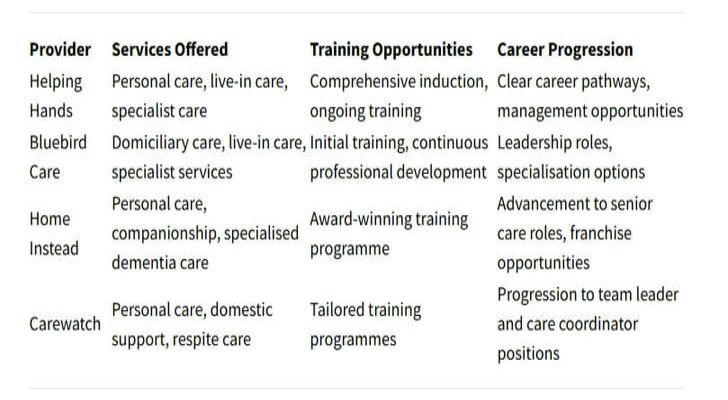Home Care Job Employment Guide
With the aging population and changes in family structure, home care work plays an increasingly important role in modern society. Home care not only includes basic care for the elderly, the disabled and other individuals who need additional support, but also involves psychological support and social interaction. The following is a detailed description of home care, covering work content, service types, development prospects, required skills and qualifications, methods for finding local jobs and salary ranges.

Home Care Work Content
1. Daily life care:
• Assist patients with personal care, such as bathing, dressing, eating, going to the toilet, etc.
• Help patients maintain personal hygiene and prevent infection.
2. Medical care:
• Supervise and manage the use of drugs to ensure that patients take their medications on time.
• Perform simple medical procedures such as changing dressings and monitoring blood pressure and blood sugar.
• Provide disease management and health guidance, such as care for chronic diseases such as heart disease and diabetes.
3. Rehabilitation support:
• Guide rehabilitation exercises to help patients restore physical functions.
• Provide physical therapy or occupational therapy support to enhance the patient's independence.
4. Emotional support and companionship:
• Engage in emotional communication and social activities to reduce the patient's loneliness.
• Listen to the patient's troubles and needs and provide psychological comfort.
5. Housekeeping:
• Assist in completing daily housework, such as cleaning, laundry, cooking and shopping.
• Ensure that the home environment is safe, comfortable and suitable for the patient's life.
Types of Home Care Services
Home care is mainly divided into the following categories according to the specific needs of patients and families:
1. Personal care:
For patients who need basic life assistance, provide services such as bathing, dressing, feeding, etc.
2. Medical care:
Provide professional health care, including basic care, drug management and monitoring of patients' health status.
3. Rehabilitation care:
For patients recovering from surgery or illness, provide physical therapy and training to help patients regain function.
4. Dementia or elderly care:
Provide professional support specifically for patients with Alzheimer's disease or other cognitive impairments, including daily care and emotional support.
5. Hospice care:
Provide palliative care, emotional support and comfort care for terminally ill patients and their families.
Development Prospects of Home Care
The prospects of the home care industry are very optimistic, mainly reflected in the following aspects:
1. Aging population:
With the increase in the elderly population, the demand for home care continues to rise, especially for patients with chronic diseases and the elderly.
2. Preference for home environment:
More and more patients prefer to receive care in a familiar home environment, and home care has become a more popular choice.
3. Support from technological progress:
The rapid development of health technology, such as telemedicine and smart devices, has enhanced the service capacity and efficiency of home care.
4. Policy support and insurance coverage:
The government and insurance companies are increasingly supporting and covering home care services, providing assistance to the industry.
Skills And Qualifications Required For Home Care
Home care workers need to have a variety of skills and qualifications to ensure that they can provide high-quality care services to patients:
1. Basic nursing skills:
Including personal care skills, the ability to operate medical equipment, and the skills to monitor vital signs.
2. Communication and interpersonal skills:
Excellent communication skills help to communicate effectively with patients and their family members.
3. Compassion and patience:
Nursing staff need to be compassionate and patient to meet the emotional needs of patients.
4. Emergency handling ability:
The ability to respond quickly in emergency situations and deal with unexpected problems is very important.
5. Professional certification:
Depending on the regulations of the state, nursing staff may need to obtain relevant professional certifications, such as nursing assistant (CNA) or registered nurse (RN) licenses.
Finding local home care jobs
Steps and suggestions for finding home care jobs include:
1. Online recruitment platforms:
Websites such as Indeed, LinkedIn, Care.com and SimplyHired can be used to find home care positions.
2. Professional nursing agencies:
Visit the official websites of local home care agencies to learn about their recruitment information.
3. Social networks:
Use social media platforms and professional networks to join relevant nursing career groups to obtain information and resources.
4. Recommendations and word of mouth:
Find reputable nursing agencies through recommendations from friends, family or former colleagues.
5. Career fairs:
Attend nursing career fairs to communicate directly with employers and learn about job opportunities.
Home Care Salary Range
The salary range for home care varies by region, experience, and specific service type. Generally speaking:
1. Primary caregivers:
For example, the starting salary for a nursing assistant (CNA) is usually between $13 and $18 per hour.
2. Registered nurses (RN):
Registered nurses in community care usually have higher salaries, with an average annual salary range of $55,000 to $85,000.
3. Professional caregivers:
Professional caregivers who provide specific medical services (such as physical therapists) can receive higher salaries, with an average annual salary of more than $70,000 to $100,000.
4. Regional differences:
Salary levels vary significantly in different regions, and generally salaries in large cities are higher than in rural areas.
Exploring Home Care Providers in the UK
For those interested in pursuing a career in home care, it’s essential to understand the landscape of providers in the UK. Several reputable companies offer employment opportunities and training for aspiring home care workers. Here’s a comparison of some well-known home care providers:

Conclusion

Home care work provides important support and protection for many people in need. With the increasing demand in the industry, there is a promising career path for home care, and the professional skills and compassion of caregivers are key to providing high-quality services. For those who want to work in this industry, understanding the work content, types of services, and how to find a job will lay the foundation for a successful career.
